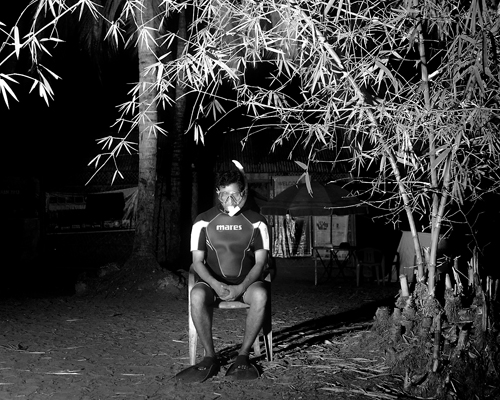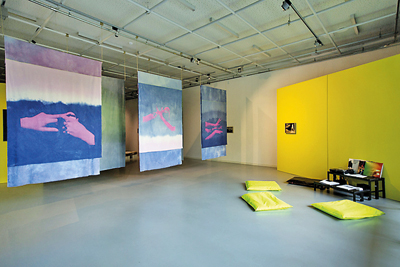Colomboscope: A brush with marine life

Bangladeshi Shadman Shahid’s “Another day in Paradise” will feature photographs of the coral landscape and communities of St. Martin Island, in the northeastern Bay of Bengal
Art festivals have historically offered possibilities for strengthening, and galvanizing local and regional identities, to artistically influence and advocate for social change. Yet as they grow in scale, absorbing powerful, private and state financial interests, they have a reputation for becoming platforms where cultural impact becomes replaced by cultural spectacle. The sixth edition of Colomboscope however, has decidedly taken a different path. Independently organised by the team Festival Works, “Sea Change” invites over 30 visual artists, filmmakers, musicians, cultural practitioners, scientific experts and the public into a sustained and stimulating dialogue.
Many events at the festival will feature immersive interventions into Sri Lanka’s geographic diversity and its interactions with society. Cooking Sections (Daniel Fernández Pascual and Alon Schwabe) – a duo of spatial practitioners based out of London, will ask what it means to be a Climavore, hosting a performative dinner event prepared with foraged ingredients from mangrove wetlands in Sri Lanka. Diners at “Climavore: On Mangroves & Mudflats” will sit among branches and roots, to imagine an eventuality of an infrastructure of food production and consumption, that would emerge as a result of man-induced climatic events.
Danish artist Søren Dahlgaard will host a participatory performance that involves an inflatable island along the beach where participants may encounter and engage in collective movements with the floating sculpture drawing attention to the threats facing Sri Lanka’s marine ecology.

The Many Headed Hydra: A collaborative feminist and decolonial art project
A Youth Forum with the Blue Resources Trust and the German Embassy, will provide a platform for young conservationists, artists and nature enthusiasts to share knowledge about marine archaeology, and coastal conservation efforts. The forum will be hosted by marine biologists Nishan Perera and Daniel Fernando as they document the beauty, threats, and conservation of coral reefs and manta rays in Sri Lanka. A beach clean-up at the Dehiwala beach will be part of this effort.
Looking at the island’s trade and seafaring histories, the TBA—21 Academy at the Goethe-Institut on January 25 titled The Ocean is on Air will lead artists, scientists, and thought-leaders in fostering a deeper understanding of the ocean and creative solutions to its most pressing issues. Conceived by Chus Martínez in collaboration with festival curator Natasha Ginwala and Julieta Aranda, the event will screen documentary series by the Inhabitants to tackle the subject of deep-sea mining and a better understanding of the ocean floor. Bangladeshi artist Shadman Shahid’s “Another day in Paradise” features photographs of the coral landscape and communities of St. Martin Island, an eight-kilometre island in the northeastern Bay of Bengal that seemingly materialized out of nothing after an earthquake hit the Bay of Bengal a few centuries ago. Subsequently settled on, its fragile ecology has endured a tourism boom, coral bleaching and escalating violence between the fishing community and has been estimated to disappear by 2050.

Sissel Tolaas: Smell researcher, artist, chemist, and smell theorist
The Many Headed Hydra formed by artist Emma Haugh and curator Suza Husse in dialogue with Lankan artists, graphic designers, and writers will present a collaborative feminist and decolonial art project. Meanwhile, Sissel Tolaas, a smell researcher, artist, chemist, and smell theorist will present her smell archive of olfactory information collected in the Southern and Western coastline of Sri Lanka. She will also host children’s workshops that relate collective memory to scent, address the dangers of pollutants and explore the shared heritage of marine resources.
Bookended by the musical performances Eternal Tides and Samudram, Hania Luthufi brings together various musicians to musically interpret various temperaments of the sea.
Port infrastructure and urban development along the coast, is yet another essential component to having holistic conversations around the topic of Sea Change. Robin Meier will compose a performance cycle dedicated to the wild birds of Slave Island. Meier’s daily performance with local musicians, Collective Feeding sees crows, mynahs and many other bird species, dialogue with humans.
The Taste Karaththé, an animated public installation by artist Firi Rahman will be on the move between Rio Complex and Galle Face Green. Through oral histories, it catalogues the degradation occurring within water-based ecosystems as a result of rapid urban growth and commercial infrastructural development. Fort Trails- Chryshane Mendis’s heritage tour meanwhile will trace colonial-era buildings and hidden locations in the Colombo Fort, unveiling their layered histories.
Colomboscope will be held from January 25-31 from 10 a.m. to 7 p.m. at the Rio Complex and Barefoot Gallery and the festival night venue, B52 at the Grand Oriental Hotel from 6 p.m. to 11 p.m. For more information visit www.colomboscope.lk
See also www.sundaytimes.lk for an exploration into the Colombo’s port’s history as a preview to the festival


